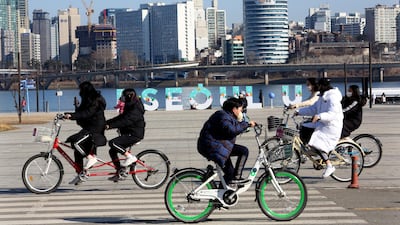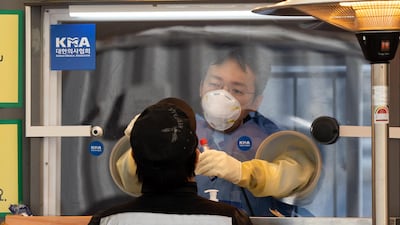South Korea is experiencing a massive surge in cases, deaths and hospitalisations, a month after easing public health measures put in place to limit the spread of Covid-19.
The crisis – which the government is hoping to mitigate with antiviral pills, including Pfizer’s Paxlovid and Merck’s Molnupiravier – is placing a huge strain on crematoriums.
The country was once known as a world leader in the response to the pandemic, quickly implementing testing, tracking and tracing, and keeping hospitalisations and deaths to a minimum.
But as restrictions have eased, cases have soared, topping 490,000 on Tuesday, according to the Korea Disease Control and Prevention Agency (KDCA).
That’s still far below the peak in early March of 621,205 cases, but at such high numbers, deaths are rising, even if the Omicron variant overall causes less severe illness and results in a low mortality rate compared to the previously more dangerous Delta variant.
The death toll nearly doubled in about six weeks, with daily fatalities peaking at 429 last Friday, fuelling demand for funeral arrangements.
The government on Monday instructed the 60 crematories nationwide to operate for longer hours to burn up to seven bodies from five, and the 1,136 funeral parlours capable of storing some 8,700 bodies to expand their facilities.
Authorities have already boosted the combined daily cremation capacity from about 1,000 to 1,400 per day starting last week. But a large backlog of bodies and a long wait continued to be reported in the densely populated greater Seoul area, government officials said.
Health ministry data showed the 28 crematories in Seoul city were operating at 114.2 per cent capacity as of Monday, while the ratio stood at about 83 per cent in other regions, such as Sejong and Jeju.
The number of critically ill patients has been hovering above 1,000 over the past two weeks, but it could go up to 2,000 in early April, health ministry official Park Hyang said.
Around 64.4 per cent of the intensive care unit beds are occupied as of Wednesday, compared with some 59 per cent two weeks earlier.
"The medical system is under substantial pressure, though it is still operated within a manageable range," Mr Park said.
"We would focus more on high risk groups going forward, and make constant checks to ensure that there is no blind spot."
Despite this worsening situation, the country's infection and death rates are still far below those recorded elsewhere, as almost 87 per cent of its 52 million residents are fully vaccinated and 63 per cent have received booster shots.
New covid pill approved
South Korea's drug safety agency said on Wednesday it has decided to give emergency approval for the use of Merck's Covid-19 treatment pill for adults, the Yonhap news agency reported.
The Molnupiravir tablet, branded as Lagevrio, is the second oral antiviral to be authorised in South Korea after Pfizer Inc's Paxlovid.
Lagevrio will only be administered to patients aged 18 or older, who are not pregnant and unable to use injection medications and the highly effective Paxlovid, the report said.














